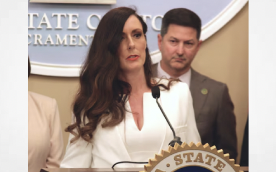Victoria Burke remembers waking up in the hospital in December 2019, unsure of how she got there. The last memory she had was of getting drinks with an old acquaintance.
“One minute I’m in this nice restaurant, and the next minute I’m waking up, coming out of a severe coma in the ER, not knowing how I got there,” Burke says. “It was absolutely terrifying.”
She eventually pieced together what happened: After drinks, this individual brought her back to her apartment complex. They stayed in his car for more than an hour until 911 was called. Paramedics arrived and found Burke incoherent, vomiting, her shirt askew and breasts exposed. The acquaintance didn’t stick around.
Burke believes this person assaulted her.
In recounting this painful event to a friend, who is also a lawyer, her friend had a stark warning: Don’t say this person’s name or publicly accuse him of assault.
“‘He could sue you for defamation,‘” Burke says she remembered her friend saying.
Burke was shocked — and angry.
Her friend was right: In the years since the #MeToo movement took off — when women spoke out publicly about sexual assault and harassment by powerful men in an effort to hold them accountable — many of the people accused of misconduct have filed defamation lawsuits against their accusers. Although some lawyers say that this option gives people who have been wrongly accused a way of clearing their names, Burke and other advocates say the suits can intimidate victims into silence.
It’s played out in public, high-profile cases like that of singer Ke$ha and music producer Dr. Luke and actors Johnny Depp and Amber Heard.
But the reach of the problem goes far beyond the rich and famous, says Jennifer Mondino, senior director of the National Women’s Law Center’s Times Up Legal Defense Fund.
“From my end, I am having people in all walks of life and all kinds of industries in all parts of the country facing these kinds of defamation charges as a form of retaliation,” Mondino says.
She says she sees students and low-income service workers threatened with defamation lawsuits for speaking out. Even when accusers file complaints about harassment to employers or law enforcement, there have been incidents where the accused uses these statements to file defamation cases, Mondino says.
Since learning about this, Burke, an attorney and professor at Southwestern Law School in Los Angeles, says she’s decided to use her legal skills and her assault as motivation to protect victims of assault, abuse and harassment from retaliatory defamation lawsuits.
Along with legislators from New Hampshire, New Jersey, Delaware and Oregon, Burke is pushing to alter state-level defamation laws to ensure they can continue to speak out against their abusers.
Read full report





